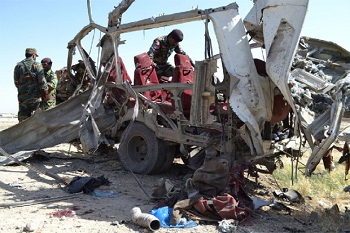 |
|
Pakistani security forces comb through the burnt wreckage of a vehicle in Quetta, following a deadly roadside bomb attack targeting a police convoy on May 23, 2013. The explosion killed at least 11 police and two civilians. Photo by the Associated Press. |
The Tehrik-e-Taliban-e Pakistan (Movement of the Taliban in Pakistan, or TTP) claimed responsibility for today’s deadly roadside bomb attack in the city of Quetta. Pakistani authorities confirmed that 11 members of a newly created elite police unit and two civilians were killed after a rickshaw packed with explosives detonated as a security convoy passed by. At least 20 others were wounded, and authorities cautioned that the death toll could rise.
Additional details were reported by the Associated Press:
The rickshaw was packed with around 100 kilograms (220 pounds) of explosives and was parked alongside a road in the city [Quetta]. It was detonated by remote control when a vehicle carrying members of the police’s special forces team passed by, said senior police officer Fayaz Sumbal.
Eyewitness Irshad Ali said the blast “was so loud, we thought something had fallen from the sky.” The bomb completely destroyed the police vehicle, leaving little more than twisted sheets of metal.
The special forces unit that was targeted was put together months ago to deal with increasing incidents of kidnappings and shootings in Baluchistan, said Sumbal.
The TTP were quick to claim the attack. “We proudly claim responsibility for Thursday’s blast in Quetta and the target was local police,” Taliban spokesperson Ihsanullah Ihsan told Reuters. “The Balochistan police recently arrested and killed some of our colleagues belonging to the Swat Taliban.”
The TTP were heavily involved in orchestrating a series of bombings prior to Pakistan’s national elections held on May 11, including a bloody twin bomb attack in Karachi targeting the election office of the Muttahida Qaumi Movement (MQM) party. That attack killed at least three people and wounded 34 others, al Jazeera reported.
Prime Minister-elect Nawaz Sharif has repeatedly called for engaging the Taliban in talks to help end the rising militancy, but the TTP have so far rebuffed these efforts. The TTP, which had initially called for conditional peace talks with the Pakistani government on Feb. 3, temporarily suspended the offer on March 20, 2013.
Are you a dedicated reader of FDD's Long War Journal? Has our research benefitted you or your team over the years? Support our independent reporting and analysis today by considering a one-time or monthly donation. Thanks for reading! You can make a tax-deductible donation here.








4 Comments
Great news! Who knows maybe with a little bit of luck “The Rickshaw Bombers” will mistakenly(preferably by design) ‘blow-up’ Mullah Omar and/or Zawahiri.
Why would the TTP attack the Pakistani security forces when those security forces support the them and want to work with them?
The police security forces are civil, not military forces. The military and the civil government don’t see eye-to-eye, and the civil government has little control over the military. The ISI is the part of the military that supports the terrorists, and seems extremist even by the military’s standards.
In short it is an insane mess that will need to get a lot worse before it gets any better.
First, you have to understand what Pakistan is and go back to 47.
The national language of Pakistan is Urdu, which is a form of Hindi that was used in the mughal camps and spoken in a place called the Hindi belt near the Himalayas and Bangladesh.
An urdu speaking elite there, wanted partition and got it.
—
Now, there is a region of West Pakistan called Punjab which has 1/2 the population and the majority of the military (long history of foreign invaders and war) the military is used to run the other provinces like colonies.
There is a long-held belief of a 1000 years of muslim rule in India and since the capitals of India have been Lahore or Delhi (both in either country’s Punjab) it is easy to manipulate people into serving the agenda of an Islamic state.
—
Now, Balocistan has 5/180m people but a majority of the resources and 40% of the land area. It is a famous area which stopped Arab advances for 70 years while the rest of the world died in 8, and currently is in the midst of a foreign funded insurgency. (India, USA, etc.)
The ISI is also a weird character, all players serve their own interests. Since 9/11 and Pakistan’s war on terror, really a war against Pashtuns who have never accepted being split from Afghanistan from the time of the Sikh empire, there have been terrorists attacks against Pakistani Security Forces.
Really, it is the other ethnic groups, really the Pashtuns who are the second largest and have historical grievances attacking the Punjabi security forces.
–
There is a lot of tension between the civilian and military gov. This recent election was the first civ-civ transition of gov. and a perfect example of the conflict is the Sikh insurgency across the border.
When it came to peace talks in 91 betwee the Sikhs and Hindstan (land of the hindus, India) Benazir Bhutto sabotaged these talks and gave away all ISI info to the Indians even though the ISI and average pakistani (really punjabis) supported the sikhs, as they are divided by religion but not clan or blood-line.
–
Just a little history lesson, and what’s up NATO will not win in Afghanistan until it is willing to cut off the tongues of criminals and hang them by the city gates like a certain Napoleonic General of old did under Maharaja Ranjit Singh.
Peshawar the old gem of the Afghans remains in Pakistan because of it today.